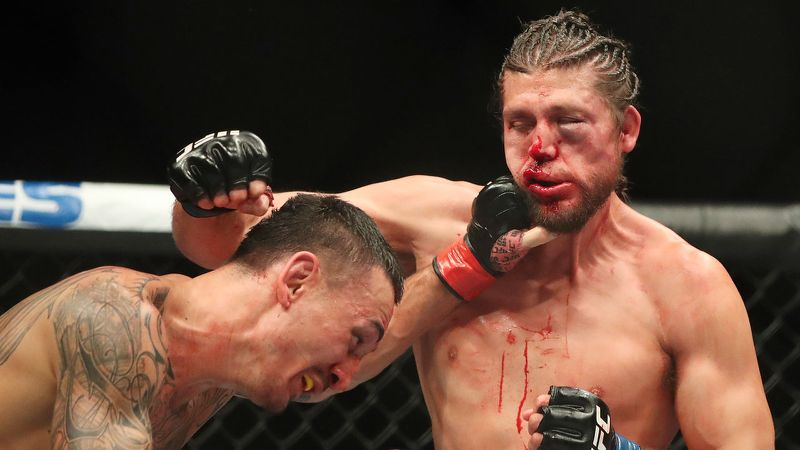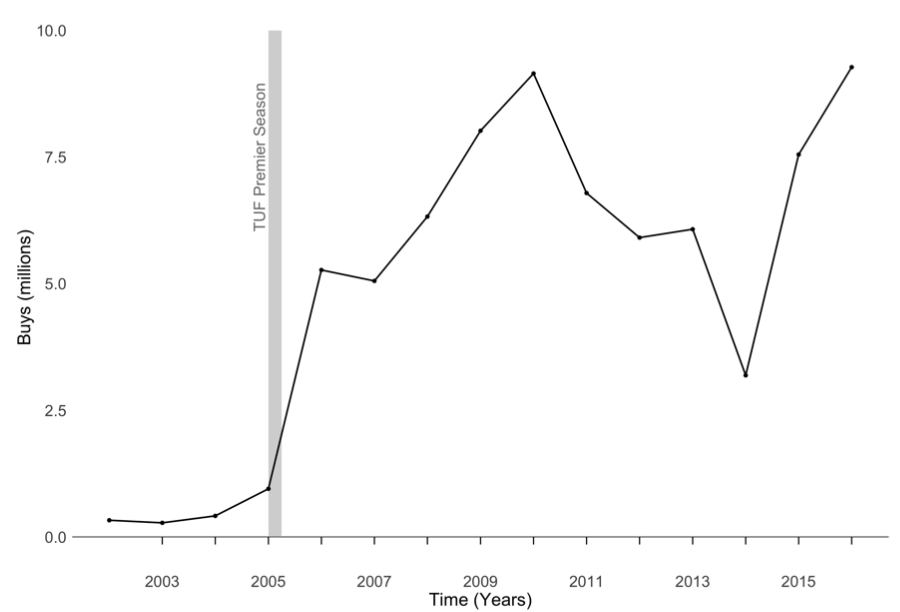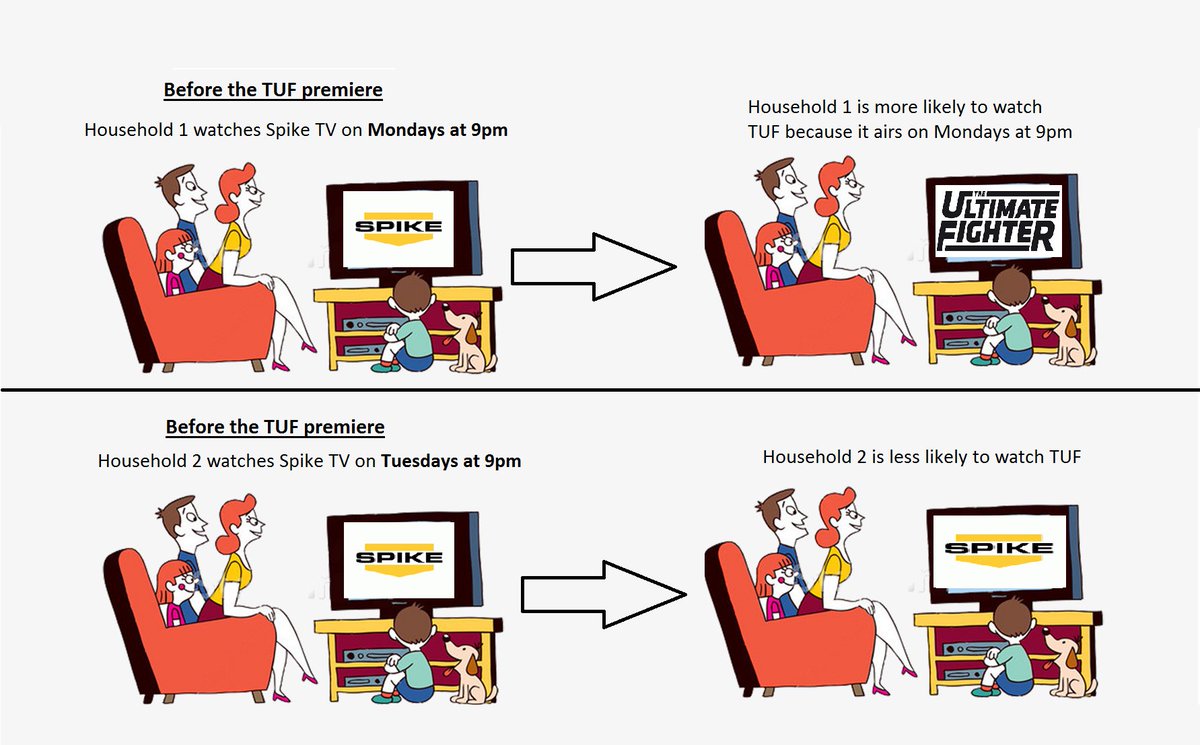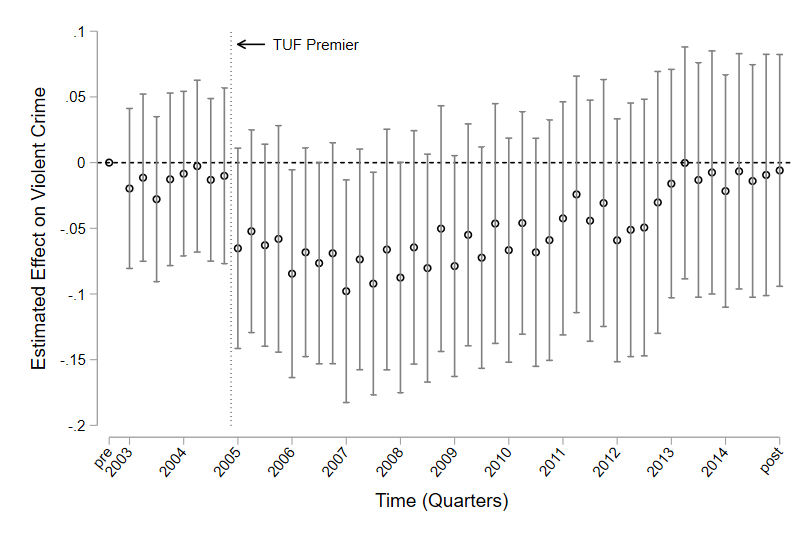Persistent Effects of Violent Media Content
by me + @IsaacDSwensen + @GlenWaddell
Interested in crime, violence, or media? Or the weird reason this may be my favorite paper I& #39;ve written? Or a surprising (to me) econometric result? Read on.
1/n
Weird reason this may be my favorite paper I& #39;ve written...
I think you& #39;re initially going to be skeptical.
"A @ufc TV show significantly *reduced* violent crime over a period of *years*?!"
But I think the evidence is strong and you& #39;ll be convinced. That& #39;s fun to me :)
2/n
I think you& #39;re initially going to be skeptical.
"A @ufc TV show significantly *reduced* violent crime over a period of *years*?!"
But I think the evidence is strong and you& #39;ll be convinced. That& #39;s fun to me :)
2/n
Background. Huge lab-based literature shows violent media content  https://abs.twimg.com/emoji/v2/... draggable="false" alt="⬆️" title="Upwards arrow" aria-label="Emoji: Upwards arrow"> aggression. Little evidence on effects of real-world choices. Dahl and @sdellavi show
https://abs.twimg.com/emoji/v2/... draggable="false" alt="⬆️" title="Upwards arrow" aria-label="Emoji: Upwards arrow"> aggression. Little evidence on effects of real-world choices. Dahl and @sdellavi show  https://abs.twimg.com/emoji/v2/... draggable="false" alt="⬇️" title="Downwards arrow" aria-label="Emoji: Downwards arrow"> in violence from violent
https://abs.twimg.com/emoji/v2/... draggable="false" alt="⬇️" title="Downwards arrow" aria-label="Emoji: Downwards arrow"> in violence from violent  https://abs.twimg.com/emoji/v2/... draggable="false" alt="🎥" title="Movie camera" aria-label="Emoji: Movie camera"> releases. @patmarkey and @causalinf examine
https://abs.twimg.com/emoji/v2/... draggable="false" alt="🎥" title="Movie camera" aria-label="Emoji: Movie camera"> releases. @patmarkey and @causalinf examine  https://abs.twimg.com/emoji/v2/... draggable="false" alt="🎮" title="Video game" aria-label="Emoji: Video game"> finding similar or no effects.
https://abs.twimg.com/emoji/v2/... draggable="false" alt="🎮" title="Video game" aria-label="Emoji: Video game"> finding similar or no effects.
3/n
3/n
But no prior evidence on *long-run effects* from the lab or real world. The strategies used in prior studies just haven& #39;t been well suited to capturing such effects. But we think our strategy is. So that& #39;s the main reason most researchers should be interested in our paper.
4/n
4/n
So...what& #39;s the treatment? The premier of the show The Ultimate Fighter. A hit show that served as a trojan horse to bring @ufc content into households across the US. What is is UFC? Violent mixed martial arts bouts. Now about as popular as pro hockey, covered by ESPN, etc.
5/n
5/n
But UFC struggled early on. Called "human cock-fighting" by McCain. Lost lots of money. Ownership decided to produce a reality TV show to promote the show. It worked previously for their casinos https://abs.twimg.com/emoji/v2/... draggable="false" alt="🤷♂️" title="Man shrugging" aria-label="Emoji: Man shrugging"> The Ultimate Fighter was a *huge* success. See PPV sales for main events.
https://abs.twimg.com/emoji/v2/... draggable="false" alt="🤷♂️" title="Man shrugging" aria-label="Emoji: Man shrugging"> The Ultimate Fighter was a *huge* success. See PPV sales for main events.
6/n
6/n
We leverage habit persistence in TV viewing habits to identify the effects. (Please think back to 2005 to understand.) Think about two households who watch the same amount of Spike TV in & #39;04, but one typically watches in the time slot that Ultimate Fighter will air on in & #39;05.
7/n
7/n
We actually analyzing crime rates for police agencies across the US from 2001-2016 and ratings data are measured for counties. So think about the thought experiment aggregated up to the county level. Some counties get a lot of exposure bc of 2004 habits, others less.
8/n
8/n
We& #39;re using this variation in the context of a diff-in-diff. Notably, controlling for overall 2004 Spike TV ratings eliminates differences in crime rate trends and levels across counties.
9/n
9/n
We have a table that pools periods together to speak to joint significance, but this the story in one figure. Pre-trends look good + a clear precipitous effect that is apparent exactly in the quarter the show begins airing.
10/n
10/n
Metrics issue  https://abs.twimg.com/emoji/v2/... draggable="false" alt="😕" title="Confused face" aria-label="Emoji: Confused face"> The effect is clearly statistically significant on the basis of in-time randomization inference. Just look at the graph. No drop as big as the one corresponding to the premier of the show. But tests using standard errors (even pooled) are close to 0.05
https://abs.twimg.com/emoji/v2/... draggable="false" alt="😕" title="Confused face" aria-label="Emoji: Confused face"> The effect is clearly statistically significant on the basis of in-time randomization inference. Just look at the graph. No drop as big as the one corresponding to the premier of the show. But tests using standard errors (even pooled) are close to 0.05  https://abs.twimg.com/emoji/v2/... draggable="false" alt="😱" title="Face screaming in fear" aria-label="Emoji: Face screaming in fear">
https://abs.twimg.com/emoji/v2/... draggable="false" alt="😱" title="Face screaming in fear" aria-label="Emoji: Face screaming in fear">
11/n
11/n
What else? The clearest evidence of effects are on assault. Surprise surprise given what& #39;s depicted on the show, right. There& #39;s also a similar pattern of estimates for rape and also property crimes but those estimates are a bit smaller and they’re less precise.
12/n
12/n
Mechanisms. The results are consistent w/ what we call "follow-on incapacitation effects." Can& #39;t be explained by reduced violence while folks are watching on Monday nights. Could be explained changes in activities (watching UFC events, renting UFC videos) at other times.
13/n
13/n
We also analyze crime around the time of @ufc main events that can be viewed on PPV or in bars. There& #39;s evidence of reduced assaults there too.
14/n
14/n
What to make of this? I& #39;m proud of the work and think we& #39;ve taken a big step forward in documenting persistent effects over such a long time period. But I truly believe that researchers should be modest (despite incentives to the contrary) and no single study is definitive.
15/n
15/n
There& #39;s a huge variety of things under the umbrella of "violent media" and diff forms may have diff effects. We have a few studies showing that violent media content is crime reducing in the short run. And one (ours) showing such effects over a very long period of time.
16/n
16/n
Interested in reading more?
http://people.tamu.edu/~jlindo/PersistentEffectsOfViolentMedia.pdf
Interested">https://people.tamu.edu/~jlindo/P... in hearing more? I had a fun discussion about this paper with @jenniferdoleac which should be airing soon on @ProbCausation.
17/17
http://people.tamu.edu/~jlindo/PersistentEffectsOfViolentMedia.pdf
Interested">https://people.tamu.edu/~jlindo/P... in hearing more? I had a fun discussion about this paper with @jenniferdoleac which should be airing soon on @ProbCausation.
17/17
PS - If you& #39;re interested in our paper, you might also be interested in these two cool papers documenting very long run effects of other important TV shows.
https://www.aeaweb.org/articles?id=10.1257/app.20170300
by">https://www.aeaweb.org/articles... @kearney_melissa @phil_wellesley
http://www.kirstencornelson.com/uploads/5/2/3/7/52377999/cosby.pdf
by">https://www.kirstencornelson.com/uploads/5... @k_cornelson
18/17
https://www.aeaweb.org/articles?id=10.1257/app.20170300
by">https://www.aeaweb.org/articles... @kearney_melissa @phil_wellesley
http://www.kirstencornelson.com/uploads/5/2/3/7/52377999/cosby.pdf
by">https://www.kirstencornelson.com/uploads/5... @k_cornelson
18/17

 Read on Twitter
Read on Twitter
 The Ultimate Fighter was a *huge* success. See PPV sales for main events. 6/n" title="But UFC struggled early on. Called "human cock-fighting" by McCain. Lost lots of money. Ownership decided to produce a reality TV show to promote the show. It worked previously for their casinoshttps://abs.twimg.com/emoji/v2/... draggable="false" alt="🤷♂️" title="Man shrugging" aria-label="Emoji: Man shrugging"> The Ultimate Fighter was a *huge* success. See PPV sales for main events. 6/n" class="img-responsive" style="max-width:100%;"/>
The Ultimate Fighter was a *huge* success. See PPV sales for main events. 6/n" title="But UFC struggled early on. Called "human cock-fighting" by McCain. Lost lots of money. Ownership decided to produce a reality TV show to promote the show. It worked previously for their casinoshttps://abs.twimg.com/emoji/v2/... draggable="false" alt="🤷♂️" title="Man shrugging" aria-label="Emoji: Man shrugging"> The Ultimate Fighter was a *huge* success. See PPV sales for main events. 6/n" class="img-responsive" style="max-width:100%;"/>




